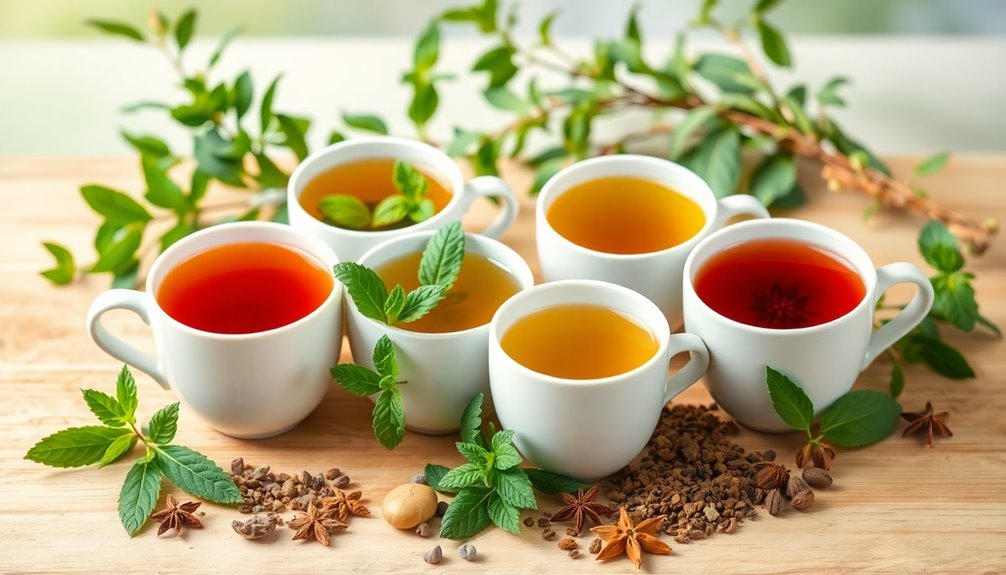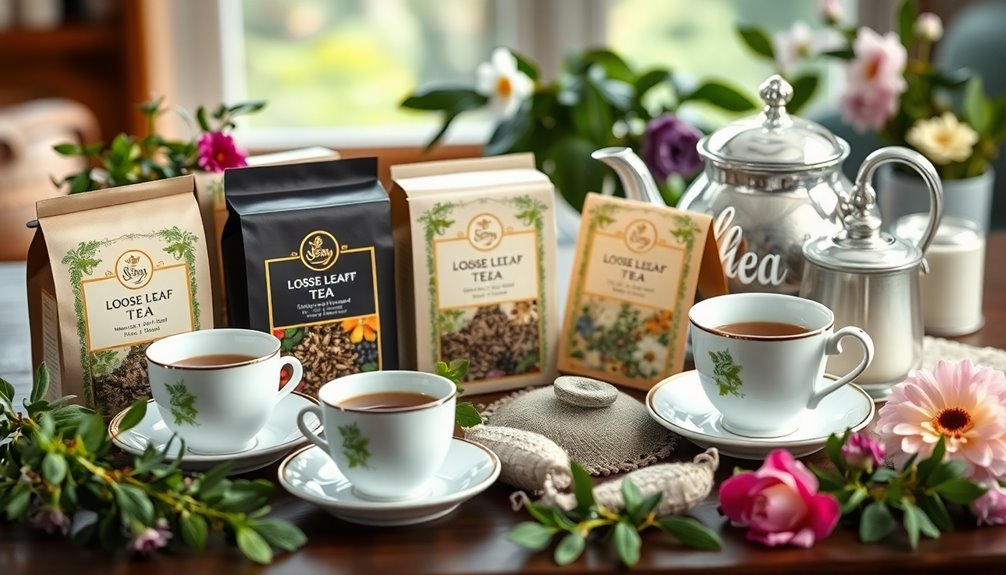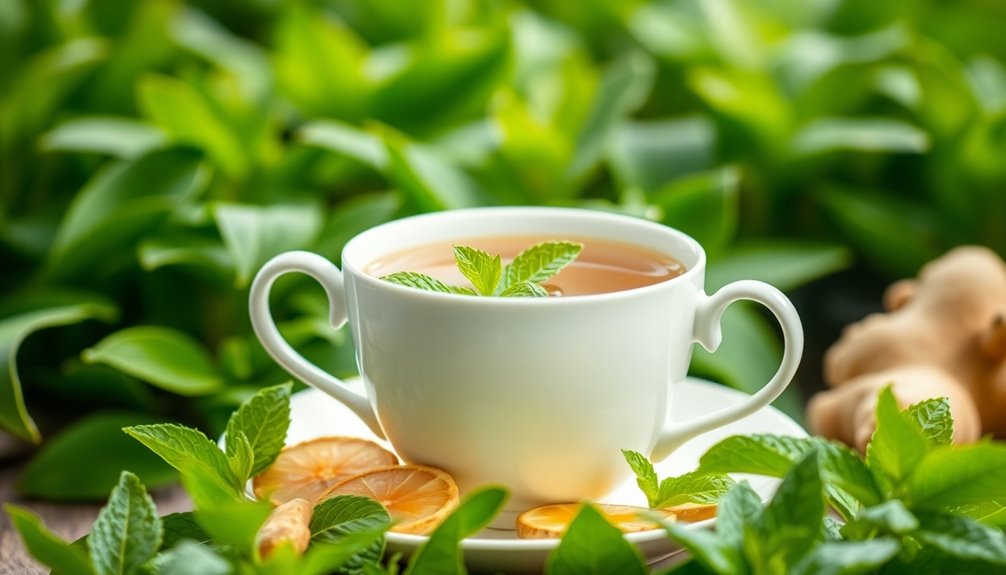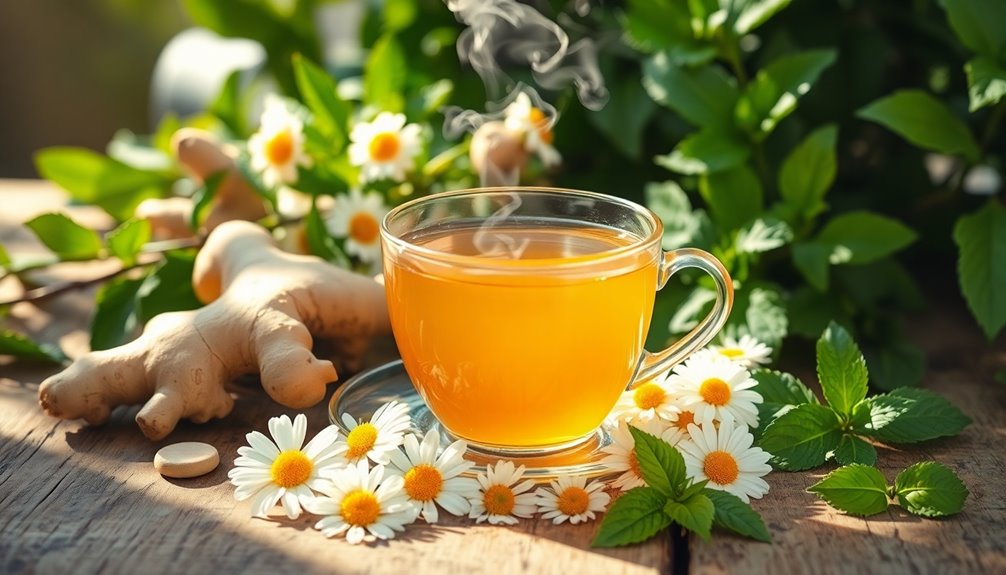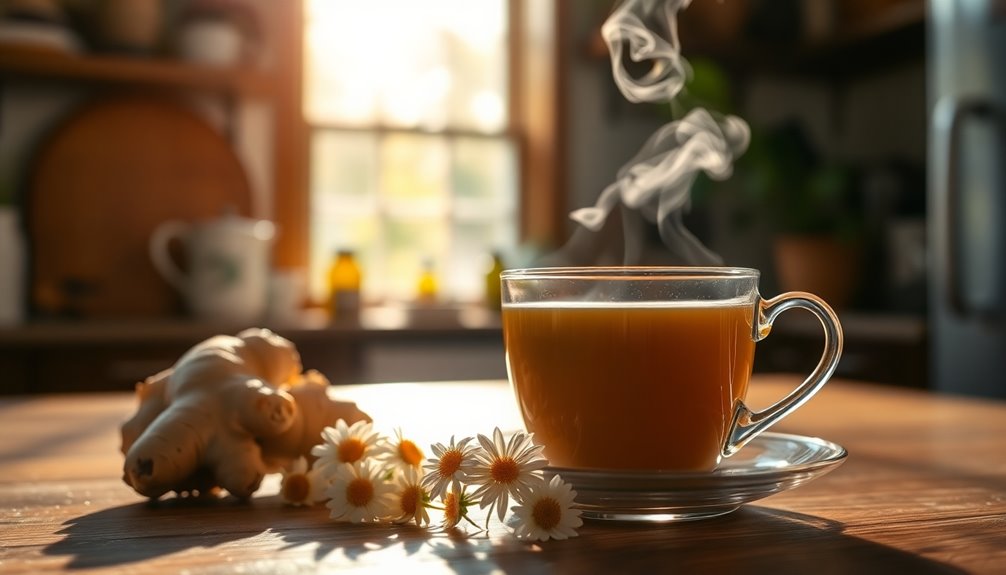If you're looking for quick relief from tummy troubles, try these five amazing teas! Peppermint tea helps ease bloating and gas, while ginger tea can chase away nausea and settle your stomach. Chamomile tea soothes those pesky digestive pains, making your belly feel calm. Fennel tea relaxes your intestines, which is great for bloating, too. Lastly, senna tea can get things moving if you're feeling a bit stuck. These herbal wonders not only taste great but also support a happy gut! Keep exploring, and you'll discover even more about these delightful teas!
Key Takeaways
- Peppermint tea relaxes digestive tract muscles, providing quick relief from bloating and gas, especially beneficial for IBS sufferers.
- Ginger tea effectively reduces nausea and improves digestion; consuming 1.5 grams daily is recommended for optimal results.
- Chamomile tea soothes gas and indigestion, making it safe for both adults and infants seeking digestive comfort.
- Fennel tea contains anethole, which helps relax intestinal muscles, alleviating bloating and cramping effectively.
- Senna tea acts as a natural laxative, promoting healthy bowel movements and providing relief from constipation.
Introduction
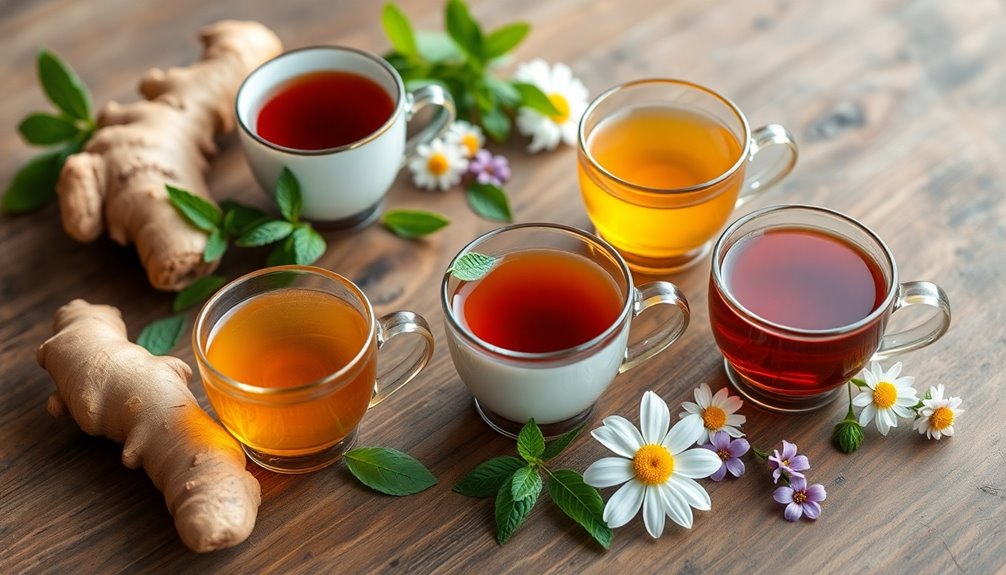
Digestive discomfort can be frustrating and disruptive, but relief is often just a cup of tea away. If you've ever felt bloated, nauseous, or had a rumbly tummy, you know how important it's to find something that helps. Luckily, herbal teas are here to save the day!
Let's start with peppermint tea. It's not just delicious; it relaxes your digestive tract muscles, making it a fantastic choice if you have IBS or feel gassy.
Next up is ginger tea, which is like a superhero for nausea. With gingerols and shogaols working their magic, it helps improve digestion when you drink it daily.
Don't forget about chamomile tea! It's calming and can ease digestive pain while helping your tummy feel better. Additionally, some flower teas, such as artichoke flower tea, are linked to improved digestion and liver health.
Digestive Benefits of Herbal Teas
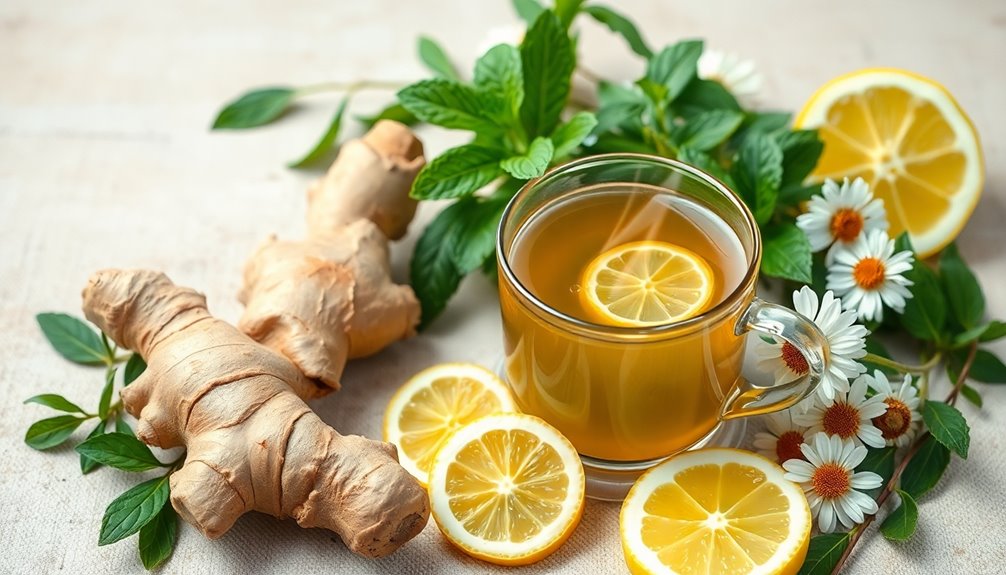
Several herbal teas can significantly improve your digestive health. If you've ever felt gassy or nauseous, peppermint tea might be your new best friend! It relaxes your digestive muscles and helps ease those uncomfortable feelings.
Ginger tea is another superstar, known for reducing nausea and vomiting, especially when you sip about 1.5 grams daily.
Chamomile tea is like a cozy hug for your tummy. It calms your intestinal muscles and can even help with colic symptoms in babies.
If you struggle with bloating or cramping, fennel tea is perfect, as it contains anethole, which relaxes those pesky intestinal muscles.
Don't forget about green tea! It's packed with antioxidants that help your gut stay healthy and happy.
And if you're worried about stomach issues, licorice tea can protect your stomach lining, keeping ulcers at bay and promoting comfort.
In short, these herbal teas offer fantastic digestive benefits. So, whether you're feeling a little off or just want to boost your digestive health, these delicious options are here for you! Enjoy sipping your way to a happier tummy!
Specific Tea Benefits Highlighted
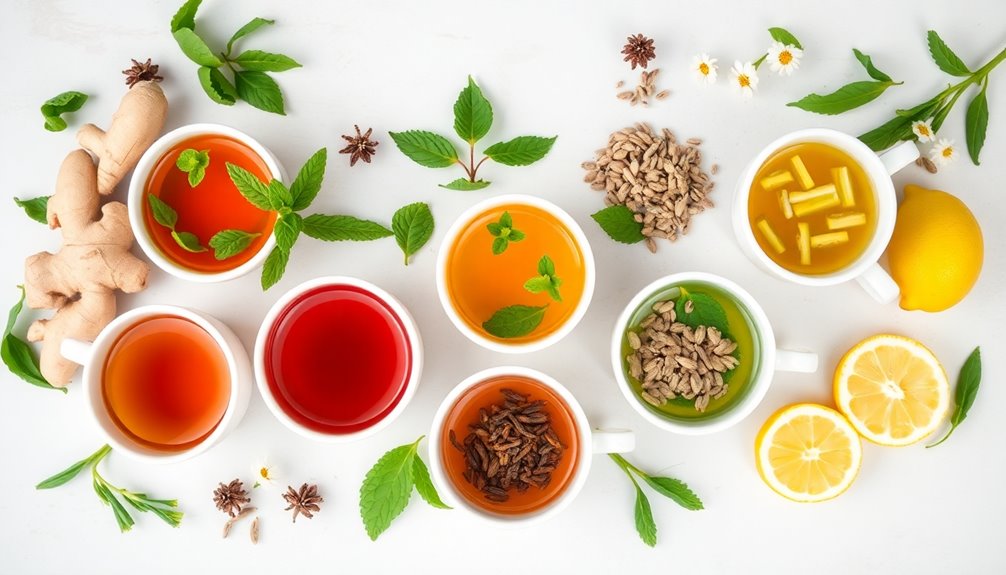
When it comes to finding relief for digestive discomfort, specific teas offer targeted benefits that can make a real difference.
Peppermint Tea is one of the best choices because it contains menthol, which relaxes your digestive tract muscles. This can really help if you struggle with irritable bowel syndrome (IBS).
Ginger Tea is another great pick! It's fantastic for reducing nausea and can even help with reflux. Drinking it regularly can make your tummy feel much better.
Chamomile Tea is known for its soothing properties and can relieve gas, indigestion, and even diarrhea! It's so gentle that it helps colicky babies too.
If you often feel bloated, Fennel Tea might be your new best friend. Its special compound relaxes your intestinal muscles and eases cramping.
Lastly, there's Senna Tea, a natural laxative that stimulates bowel contractions, making it useful for constipation. Just remember, it's meant for short-term use to avoid becoming dependent.
With these tasty teas, you can support your digestive health and feel great again! So, why not give them a try?
Tea's Role in Gut Microbiome
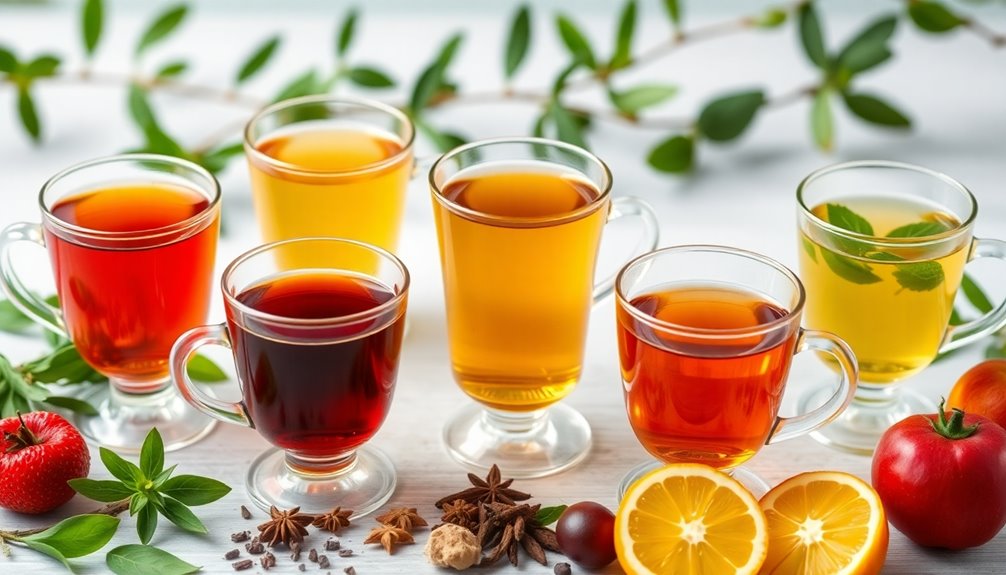
Understanding the vital role of the gut microbiome can significantly enhance your approach to digestive health. Your gut is home to trillions of tiny microorganisms, including beneficial gut bacteria that help with digestion. Drinking herbal teas can really boost these good guys! For example, ginger tea and peppermint tea can help balance your gut microbiota. This balance reduces dysbiosis, which is when bad bacteria take over, leading to uncomfortable digestive symptoms.
Chamomile tea also deserves a shout-out! It has amazing anti-inflammatory properties that support the growth of those beneficial bacteria. Plus, it helps calm your stomach, making it a perfect bedtime tea. The optimal steeping time for herbal teas can further enhance their beneficial effects on digestion. Additionally, many herbal teas are naturally caffeine-free, which makes them suitable for consumption at any time of the day. Drinking herbal teas can also promote mindfulness and relaxation, enhancing your overall digestive experience.
The polyphenol content in these herbal teas acts like a little feast for your gut bacteria, helping them thrive. When you regularly enjoy these teas, you're not just sipping something delicious; you're also promoting a healthy gut microbiome. Additionally, herbal teas like rooibos are rich in antioxidants, which can combat oxidative stress and support gut health.
This can lead to better digestion and less tummy trouble. So, why not grab a cup of your favorite herbal tea and give your gut the love it deserves? Cheers to a happy, healthy gut!
Potential Side Effects of Teas

While herbal teas can offer fantastic digestive benefits, it's important to be aware of their potential side effects. Some people might experience allergic reactions, especially if they're sensitive to herbs like chamomile or fennel.
If you're thinking about trying senna tea, remember that drinking too much can lead to dependency and might upset your tummy.
Ginger tea is usually safe, but high doses can sometimes cause heartburn or stomach upset, especially when you drink it on an empty stomach.
If you enjoy peppermint tea, be cautious if you have gastroesophageal reflux disease (GERD), as it can make your heartburn worse.
Licorice tea can be delightful, but if you drink it too often, it could lead to hypertension and potassium imbalances. So, it's super important to enjoy it in moderation!
Keep an eye on how your body reacts to these herbal teas, and if you notice any discomfort, consider cutting back or switching to a different kind.
Practical Applications
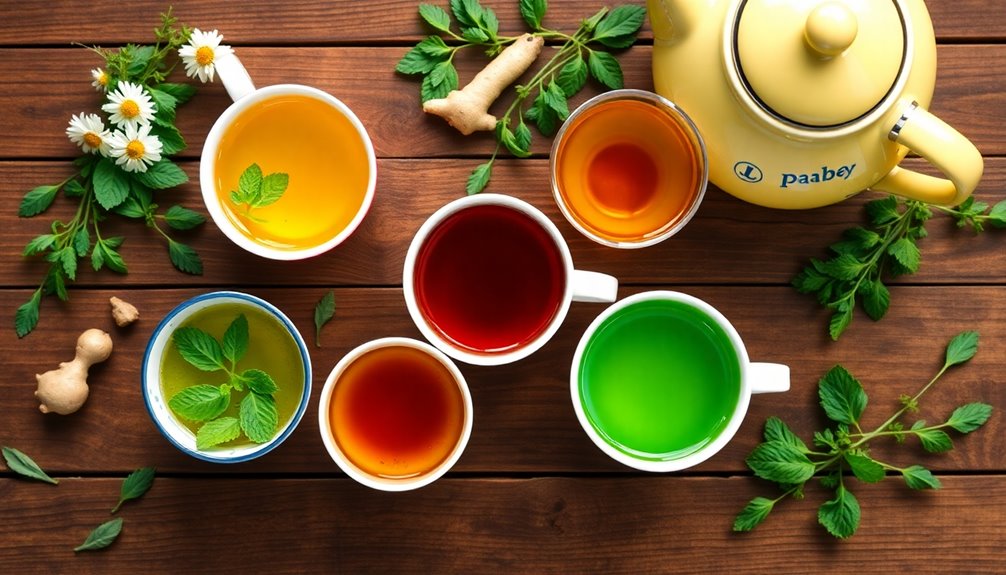
Herbal teas can be powerful allies in tackling digestive issues, offering practical solutions for relief.
If you're feeling bloated or gassy, try sipping peppermint tea! Its menthol gives it antispasmodic properties, helping you feel better in just minutes.
For those moments when nausea strikes, ginger tea is your friend. A daily dose of 1.5 grams can work wonders, especially if you're dealing with motion sickness or pregnancy-related nausea.
If you want something soothing, chamomile tea can calm your tummy and even help infants with colic. It's a comforting choice for everyone!
Fennel seed tea is another great option. Its special ingredient, anethole, relaxes your intestinal muscles, easing digestive discomfort.
Lastly, if you're struggling to relieve constipation, senna tea acts as a natural laxative. It's well-known for promoting healthy bowel movements, making it a helpful choice when you need it most.
Incorporating gentle stretching before consuming these teas can also enhance their effectiveness and provide additional digestive support.
With these five teas, you can find delicious and effective ways to support your digestive health.
Frequently Asked Questions
Which Tea Helps the Most With Digestion?
When you're looking for digestive help, ginger tea stands out. It alleviates nausea and indigestion effectively, while peppermint tea relaxes your digestive tract. Try both to see which one works best for you!
Which Tea Makes Your Bowels Move?
When you're looking to get your bowels moving, senna tea's natural laxative properties work effectively. Alternatively, ginger tea can also stimulate digestion and help relieve bloating, promoting smoother bowel movements.
What Kind of Tea Will Settle My Stomach?
If you're looking to settle your stomach, try peppermint tea for its muscle-relaxing effects or ginger tea to combat nausea. Chamomile can also soothe your digestive system and ease discomfort effectively.
Which Drink Is Good for Fast Digestion?
For fast digestion, you might try warm lemon water. It hydrates and stimulates your digestive system. Ginger tea's also great, as it boosts enzyme activity and reduces nausea, aiding in quicker digestion.
Conclusion
So, if your tummy's feeling a bit grumpy, grab a cup of one of these amazing teas! Whether you choose peppermint, ginger, or chamomile, each sip can help calm your digestive woes. Remember, these tasty drinks not only soothe your stomach but also support your gut health. So, let's make tea time a fun part of your day, and keep those digestive troubles away! Cheers to happy bellies and warm cups!

